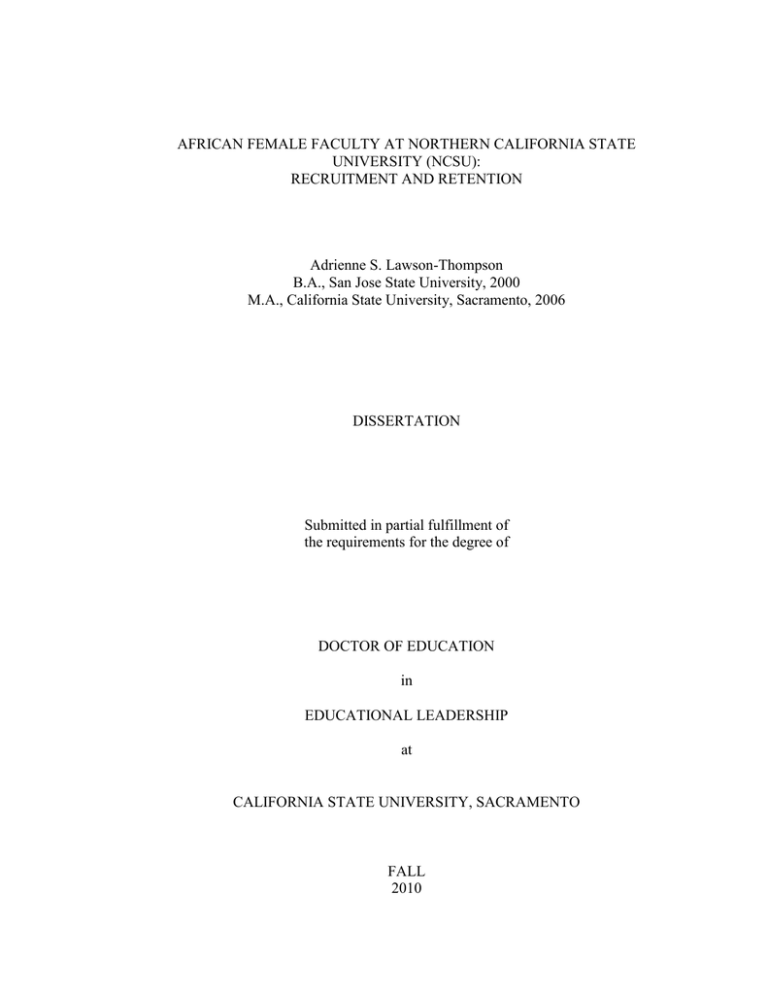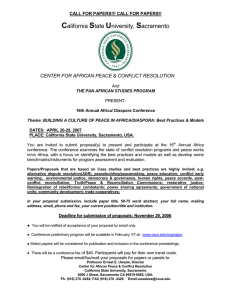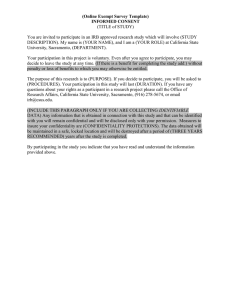
AFRICAN FEMALE FACULTY AT NORTHERN CALIFORNIA STATE
UNIVERSITY (NCSU):
RECRUITMENT AND RETENTION
Adrienne S. Lawson-Thompson
B.A., San Jose State University, 2000
M.A., California State University, Sacramento, 2006
DISSERTATION
Submitted in partial fulfillment of
the requirements for the degree of
DOCTOR OF EDUCATION
in
EDUCATIONAL LEADERSHIP
at
CALIFORNIA STATE UNIVERSITY, SACRAMENTO
FALL
2010
Copyright © 2010
Adrienne S. Lawson-Thompson
All rights reserved
ii
AFRICAN AMERICAN FEMALE FACULTY AT A
NORTHERN CALIFORNIA STATE UNIVERSITY (NCSU):
RECRUITMENT AND RETENTION
A Dissertation
by
Adrienne S. Lawson-Thompson
Approved by Dissertation Committee:
_________________________________
Carlos Nevarez, Ph.D., Chair
_________________________________
Rhonda Rios-Kravitz, DPA
_________________________________
Lisa William-White, Ph.D.
iii
AFRICAN AMERICAN FEMALE FACULTY AT A
NORTHERN CALIFORNIA STATE UNIVERSITY (NCSU):
RECRUITMENT AND RETENTION
Student: Adrienne S. Lawson-Thompson
I certify that this student has met the requirements for format contained in the University
format manual, and that this dissertation is suitable for shelving in the library and credit is
to be awarded for the dissertation.
___________________________, Graduate Coordinator
Su Jin Jez, Ph.D.
Associate Director
iv
_________________
Date
DEDICATION
Mama, thank you! I dedicate this dissertation to my loving mother, Alice Faye
Walton. She is not here to witness my educational successes, but she is here in spirit. The
memories of my mother are of a sweet, kind, and patient person who cared about others
and loved the Lord. She encouraged me to pursue higher education and that I did! Love
you mama.
In memory of Dr. Lila Jacobs a strong, beautiful woman with dignity who
believed in and fought for social justice and equity, thank you for seeing the potential in
me and being my mentor. You are greatly missed, but your spirit is alive in the first
doctorate cohort. We love you!
v
ACKNOWLEDGMENTS
First, I would like to reverence God Almighty for opening doors that I could not
even imagine. God has been so good to me that I cannot tell it all. I also would like to
thank my husband Keith who has been my biggest supporter. Thank you for the kind
words of encouragement, the cards, and get-away trips, taking care of the children,
cooking, and many other things you did to show your support.
Special thanks to my Uncle Sam for his encouraging words; you gave me the
vision when I could not see it myself. Once I finished graduate work, you told me, “I can
see you getting a doctorate,” that thought never crossed my mind, so thank you Uncle
Sam for planting the seed.
I would like to thank all my children (Ebony, Shaheed, Eric, Darrel, Tamica,
Cherrisse, and Nique). I spent many evenings and weekends away from home, and family
dinners, but thank you for understanding.
I extend my humble and sincerest gratitude to my dissertation chair, Dr. Carlos
Nevarez for encouraging me to apply to the doctorate program before it became a reality.
Once the program became a reality, you encouraged me to submit an application. Thank
you for your motivation and pushing me when I needed it the most. I would also like to
thank Dr. Rhonda Rios Kravitz for your no nonsense push to produce the best product. I
appreciate your passion and standing up for what you believe. Dr. Lisa William-White,
thank you for being a role model and sharing your expertise in qualitative research. I
appreciate your availability, and encouragement; words cannot express my gratitude. I
vi
would also like to thank my extended family and friends for believing in me and
encouraging me all the way.
Lastly, but you are certainly not least, I would like to extend my gratitude to the
Black Staff and Faculty Association and the California Faculty Association for your
support, scholarly research, sister circles, hugs, and Godly kisses as I pursued my
master’s degree and now
as I celebrate my doctorate. You have been with me all the way. There are too many
of you to individually name, but you know who you are, so I pray that God continues to
bless you all. Don’t stop the fight for social justice and equity. Our future depends on us,
change begins with us.
vii
CURRICULUM VITAE
ACADEMIC PREPARATION
Ed.D.
Educational Leadership & Policy Studies, ABD, December 2010
California State University, Sacramento
M.A.
Bilingual Multicultural Education, May 2006
California State University, Sacramento
B.A.
Sociology/Criminology, May 2000
San Jose State University
PROFESSIONAL EXPERIENCE
California State University, Sacramento ~ Office of Research Administration
Research Administration Coordinator, 2/2006 – Present
California State University, Sacramento ~ Division of Social Work
Curriculum Assistant, 12/2000 – 2/2006
TEACHING EXPERIENCE
Faculty Intern, Spring 2010
Los Rios Community College Faculty Diversity Internship Program
Sacramento City College – History Department
Course: HIST 320 – History of the United States: African-American Emphasis
Teaching Assistant, Fall 2009
California State University, Sacramento, Ethnic Studies Department
Course: ETHN 100 – Ethnic America (Junior Level Writing course)
Co-Instructor, Fall 2008
California State University, Sacramento, Bilingual Multicultural Education Department
Course: EDBM 265-Advocacy, Change, & Community
Adjunct Faculty (Lecturer), Fall 2006
California State University, Sacramento, Ethnic Studies Department
Course: ETHN 21-Freshman Seminar
RESEARCH EXPERIENCE
California State Library Foundation - California Research Bureau, Summer 2007
Research Consultant
California State University, Sacramento - Freshman Programs, Fall 2006
viii
Adjunct Faculty
California State University, Sacramento - Bilingual Multicultural Education, Spring 2006
Principal Investigator
California State University, Sacramento - Division of Social Work, Spring 2003-05
Research Assistant
RESEARCH INTEREST: Post-secondary education; mentoring gender and equity;
faculty diversity programs: recruitment, retention and faculty development. Community
college retention and completion for students of color; and other underrepresented
groups. Career technical education; multiple pathways/dual-enrollment.
PRESENTATIONS
Thompson, A. & Thompson, K. (2010). Where will I go from here?: Planning your life after high
school. Presented at St. Paul Family Life Center Annual Day of Learning for Youth.
Thompson, A. (2009). Knowledge is Power Program (KIPP) College Preparatory Charter
School: An Analysis of Students’ Reading Perceptions and California Standardized Test
Results. Thesis presented at the 15th Annual Multicultural Education Conference
Thompson, A. (2008). Is Faculty Diversity Important?: Recruitment and Retention Issues within
(CSU) California State University. Poster presentation at California State University,
Sacramento Educational Doctoral Program
Thompson, A. (2005). Knowledge is Power Program (KIPP) College Preparatory Charter
School: An Analysis of Students’ Reading Perceptions and California Standardized Test
Results. Paper presented at the 14th Annual Africa/Diaspora Conference
PUBLIC SERVICE
• Beyond High School Project, non-profit organization (Co-founder)
College & Career Consultant (2006 – Present)
• St. John Missionary Church
School Teacher, Family Institute Teacher, Vacation Bible School Teacher (2005 – 2010)
• Progressive Women of Excellence, Inc. INNERvention for Teen Girls Summer Program, nonprofit organization (advisory board member)
Instructor (Summer 2006)
• St. John Women and Children’s Shelter
Empowerment Lesson Leader (2005 – 2006)
ix
PROFESSIONAL AFFILIATIONS
2010 – Present
2009 – Present
2009 – Present
2009 – Present
2008 – Present
2008 – Present
2008 – Present
2007 – Present
2006 – Present
2005 – Present
CSU Graduation Initiative 2010 “Closing the Achievement Gap” Workgroup
National Association for Developmental Education (NADE) Member
Society for Research on Adolescence (SRA) Member
Sacramento State Council for Affirmative Action Member
American Educational Research Association (AERA) Member
Sacramento State Black Alumni Chapter Founder/Member
Sacramento County Neighborhood Accountability Board Member
Sacramento State Cooper-Woodson Advisory Board Member & Mentor
Sacramento State Center for African Peace & Conflict Resolution Board Member
Blacks in Government/Member
AWARDS AND HONORS
Valedictorian, 2006 - Cooper Woodson Scholars Program (CWC), California State University,
Sacramento
Woman of the Year Award, 2005 - National Council of Negro Women, Sacramento, California
TRAININGS/WORKSHOPS
2010 - Write Winning Grants Live Broadcast Seminar, Sacramento State
2010 - Office of Human Research Protections: Human Subjects Assurance Training
2009 - Project Management Lite: Managing Small Projects Effectively
2008 - Clinical Research Training Program, UC Davis Health System
2008 - Addressing the Challenges of Human Subject Research Workshop, UC Davis Health System
2007 - Great Proposal Writing Faculty Workshop, Sacramento State
2006 - Fundamentals of Sponsored Project Administration Training, Sacramento State
2006 - Diversity Training, Sacramento State
2005 - Promoting a Productive and Responsible Research Environment Training, Sacramento State
2005 - Common Management Systems (CMS) – PeopleSoft Training, Sacramento State
2003 - Conflict Resolution, Mediation and Negotiation Training, Sacramento State
x
Abstract
of
AFRICAN AMERICAN FEMALE FACULTY AT A
NORTHERN CALIFORNIA STATE UNIVERSITY (NCSU):
RECRUITMENT AND RETENTION
by
Adrienne S. Lawson-Thompson
The recruitment and retention of faculty of color remains one of the most difficult
challenges facing American higher education (Antonio, 2002; Fenelon, 2003; Perna,
Gerald & Baum, 2007; Sorcinelli & Billings, 1992; Stanley, 2006; Taylor, 2002; Webb &
Norton, 2008) especially among African American female faculty. This is problematic
considering evidence suggests that having a diverse faculty increases the retention and
graduation rates of students of color (Adams & Bargerhuff, 2005; González, 2007;
Hagedorn, Chi, Cepeda & McLain, 2007).
The purpose of this study was to explore the phenomenon of Black female faculty
recruitment and retention experiences in academia. The following research questions
guided this study: 1) What are the perceptions and experiences of the recruitment process
of African American women faculty? 2) What are the experiences of African
American/Black female faculty who went through the RTP process? 3) What factors
contribute to the successful retention, tenure, and promotion process (RTP) for Black
female faculty?
Preexisting data from the California State University (CSU) Chancellor’s office
and the California Faculty Association informed this research of the system wide racial
xi
and ethnic demographics of faculty, and specifically the status of African American
female faculty in the CSU. This qualitative research study utilized face-to-face interviews
with seven Black female faculty at a Northern California State University (NCSU).
Autobiographical methods provided participants an opportunity to theorize and make
sense of their experiences through critical self-examination and self-reflection. These
methods are especially important in establishing voice for women who have historically
experienced silence, exclusion, and experienced a sense of powerlessness within the
academy. Therefore, Black Feminist Thought (BFT) and Critical Race Theory (CRT)
were utilized to frame this study which gave respect and voice to the women in this
study. As a result, narratives and testimonies key sources of data. The researcher
analyzed common themes from interviews rather than analyze numerical data collected.
An analysis of the data provided insight into higher education cultural
environment, the ethnic and gender profile, and RTP experiences and perceptions among
African American female faculty members. Many of the participants described how
mentorship from colleagues paved the way for obtaining a faculty position, and
especially in regards to their Retention, Tenure and Promotion (RTP). Black feminist and
critical race perspectives have suggested that creating and sustaining strong connective
relationships with other Black women are essential to their social and psychological
wellbeing (Hughes & Howard-Hamilton, 2003). Moreover, participants often stated that
having a voice in faculty meetings was very important, especially when the faculty do not
reflect the demographics of students being served. The data indicated that participants in
xii
this study have a sense of powerfulness in their department, either as a leader, committee
chair, or just a faculty member with a good self-perception. Majority monoculture human
development theories are harmful when they are used as the primary lens to understand
the developmental needs and experiences of Black women because these theories are
validated on non-Black persons. According to Howard-Hamilton (2003) Black feminist
thought and critical race theory provide an appropriate framework which adds an
important element of depth to our understandings about the struggles and needs of Black
women in academia. As a result of race and racism in U.S. Higher Education, scholars
use CRT and BFT as a method of storytelling to show the permanence of race (Robinson
& Clardy, 2010). The researcher promotes the utilization of CRT and BFT as a tool of
analysis in education can help lead toward the standardization of these theoretical
frameworks to ensure the quality and richness of research (Delgado, 2001; Lee, 2008).
This study suggests that university leaders have to purposefully, strategically and
actively pursue a critical mass of African American female faculty. In addition,
university leaders have to provide the necessary structured mentoring systems in order to
promote the successful RTP of Black female faculty members. The overarching
implication of this study is that institutional leaders in the California State University
must be more deliberate about recruiting and retaining faculty of color.
xiii
TABLE OF CONTENTS
Page
Dedication ..................................................................................................................... v
Acknowledgements ..................................................................................................... vi
Curriculum Vitae ....................................................................................................... viii
List of Tables ........................................................................................................... xvii
List of Figures ......................................................................................................... xviii
Chapter
1. INTRODUCTION ……………………………………………………….. ............1
Statement of the Problem ...................................................................................2
Purpose of the Study ..........................................................................................3
Nature of the Study ............................................................................................4
Theoretical Frameworks ....................................................................................5
Black Feminist Thought and Critical Race Theory ...........................................6
Definition of Terms............................................................................................9
Limitations and Assumptions ..........................................................................11
Significance of the Study .................................................................................12
Organization of Dissertation ............................................................................15
2. REVIEW OF THE LITERATURE ...................................................................... 16
Introduction ......................................................................................................16
xiv
Historical Overview of African American Females in
Higher Education ....................................................................................17
Racism and Sexism .................................................................................18
Affirmative Action ..................................................................................21
Proposition 209 .......................................................................................21
Educational Pipeline ...............................................................................23
Challenges Faced by African American Women Faculty................................25
Institutional Racism ................................................................................25
Marginalization .......................................................................................28
Workload Issues ......................................................................................28
Positive Impact of having African American Female Faculty................30
Mentoring ................................................................................................31
Benefits of Structured Mentoring System...............................................33
Leaders Supporting Mentorship ..............................................................35
Critical Mass ...........................................................................................38
Status of Doctoral Faculty ......................................................................40
Appointment, Retention, Tenure and Promotion (ARTP) ...............................40
Recruitment .............................................................................................41
Retention, Tenure, and Promotion (RTP) ...............................................42
Scholarship ..............................................................................................43
Support Systems...............................................................................................48
Support Networks within CSU ...............................................................50
xv
Institutional Implications .................................................................................52
Responsibilities of Higher Education .....................................................52
Change in Higher Education ...................................................................56
Summary of the Literature Review ..................................................................59
3. METHODOLOGY ............................................................................................... 60
Study Purpose .........................................................................................60
Sampling Procedures ..............................................................................60
Research Method & Design ....................................................................61
Instrumentation .......................................................................................62
Data Collection Procedures.....................................................................63
Study Participants and Setting ................................................................63
Data Sources ....................................................................................................65
Data Analysis ...................................................................................................70
Protection of Human Subjects ................................................................71
Conclusion .......................................................................................................71
4. FINDINGS ............................................................................................................ 72
Interview Questionnaire Summary …………………………………………. 86
Relationship with Colleagues ..........................................................................88
Mentoring .........................................................................................................88
Retention, Tenure, and Promotion (RTP) Process ...........................................90
Participation in Governance .............................................................................91
Being Powerful ................................................................................................91
xvi
5. DISCUSSION ........................................................................................................94
Introduction ......................................................................................................94
Recommendations ............................................................................................99
Future Research .............................................................................................102
Author’s Reflection ........................................................................................104
6. APPENDICES .....................................................................................................106
Appendix A. Protection of Human Subjects ................................................. 107
Appendix B. Invitation Letter .......................................................................108
Appendix C. Consent to Participate in Research ..........................................109
Appendix D. Interview Questions.................................................................111
REFERENCES ..........................................................................................................113
xvii
LIST OF TABLES
Table
Page
1.
Ethnicity and Gender of Faculty at Northern California State University (NCSU)…68
2.
African American Female Faculty at Northern California State University (NCSU).72
3.
Identified themes from seven interviews…………………………………………….87
xviii
LIST OF FIGURES
Figure
Page
1.
CSU Students and Faculty by Ethnicity (2009)…………………………….…...66
2.
Ethnic/Racial Representation of Faculty to Students (2009)……………………67
xix



